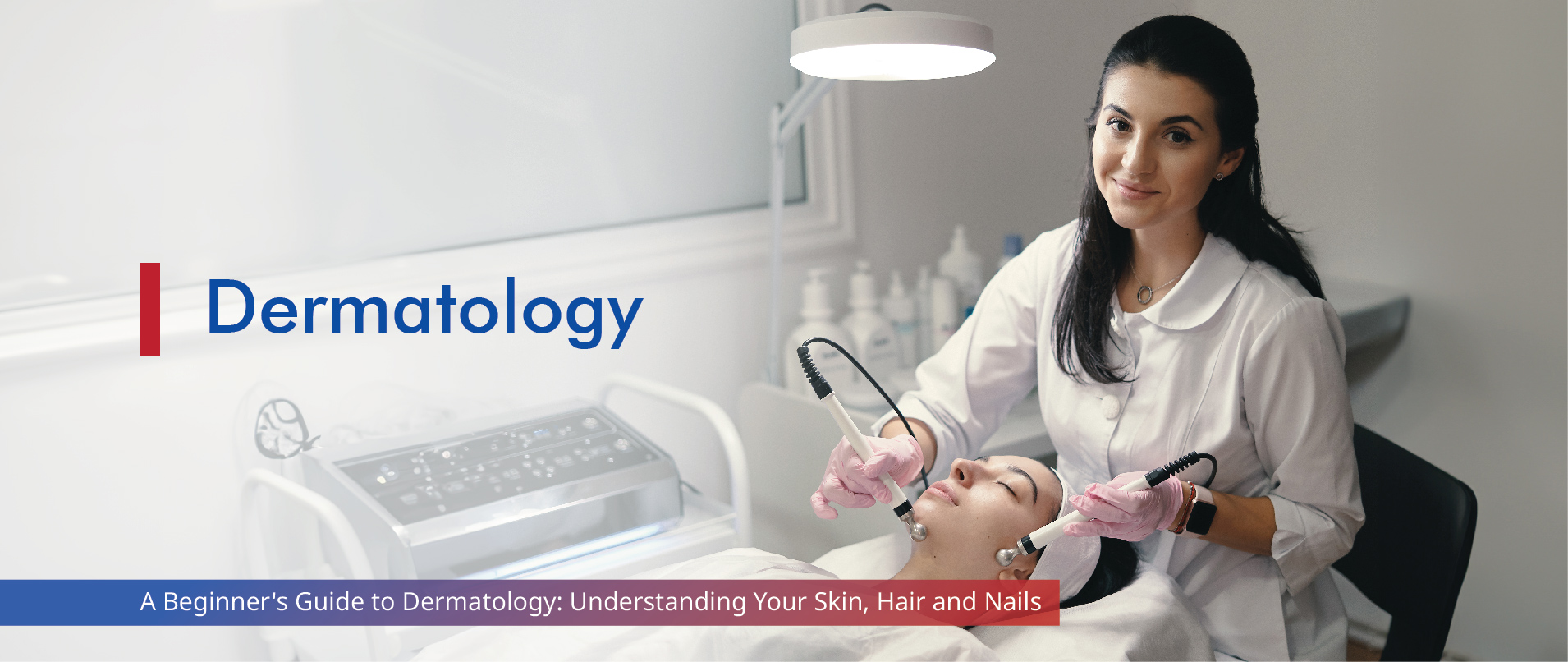What is Dermatology?
The branch of medicine focuses on skin health and appearance. This branch also caters for the health of hair and nails. The dermatology branch covers medical and surgical aspects of skin, hair, and nail disorders. This blog will try to uncover the facts about our skin and will provide tips to make it healthy.
Understanding Your Skin
The skin is a remarkable and complex structure with several distinct layers that protect you and keep you looking and feeling your best.
The skin has the following three layers:
- The Epidermis:
This is the outermost layer of your skin. It comprises several sub-layers, including:
- The outer stratum corneum, which acts as a protective barrier
- The basal layer, where new skin cells are constantly being generated
- The Dermis:
- The inner thickest layer of your skin, the dermis contains a network of blood vessels, nerve endings, and the all-important collagen and elastin fibres that give your skin its structure and elasticity.
- The Hypodermis:
- Also known as the subcutaneous layer, the hypodermis comprises fatty tissue that helps insulate your body and cushion it from impacts and injuries.
Healthy Skin Tips
Here are some tips to help you achieve and maintain healthy, radiant skin:
- Cleanse Gently:
Dr. Pratiksha Jain, underlines the importance of gentle cleansing of skin.Try to avoid using harsh, drying face cleansers. They can make your skin devoid of its natural oils. Instead, opt for a gentle, non-comedogenic (non-pore-clogging) cleanser that removes impurities without disrupting your skin’s delicate pH balance.
- Exfoliate Regularly:
Removing dead skin cells through regular exfoliation can improve skin texture, unclog its pores, and promote a more even skin tone. Be mindful not to over-exfoliate, which can lead to irritation and dryness.
- Moisturise:
Hydration is vital for healthy, youthful-looking skin. Incorporate a daily moisturiser into your routine, tailoring the formula to your skin type and any specific concerns you may have.
- Protect Against UV Damage:
Exposure to harmful UV rays can lead to premature ageing, sun spots, and an increased risk of skin cancer. Make your sunscreen a non-negotiable element of the skincare routine. Reapply it every two hours when spending time outdoors.
- Eat a Skin-nourishing Diet:
Your diet can significantly impact your skin’s health and appearance. Incorporate plenty of antioxidant-rich fruits and vegetables, healthy fats, and lean proteins to give your skin the essential nutrients it needs to thrive.
- Stay Hydrated:
Drinking optimal water throughout the day helps keep skin cells plump and healthy, reducing the development of fine lines and wrinkles.
- Manage Stress:
Chronic stress can harm your skin, leading to issues like acne, eczema, and premature ageing. “Incorporate stress-reducing activities like meditation, yoga, or simply taking a few deep breaths into your daily routine” says Dr Jain.
Healthy Hair Tips
Healthy hair makes a good impression. Maintaining hair health is important because it helps you look good, prevents damage and hair loss, boosts your confidence, and reflects overall well-being.
Some tips that you can follow to keep your hair healthy and shiny:
- Regular Washing and Conditioning:
Regular shampooing can keep your scalp and hair clean from dirt and excess oil. However, the ideal frequency varies by hair type and personal preference. After shampooing, use a conditioner to keep your hair moisturised and manageable.
- Dry Naturally:
Air drying or towel drying after shampoo is the best way to dry your hair. Avoid or limit the use of blow drying.
- Limit Styling Products:
Too much hair styling with straighteners or curlers and using colouring can damage your hair follicles, resulting in hair thinning and loss. Therefore, try to limit these products and opt for natural styling ideas.
- Gentle Handling:
To avoid breakage, handle your hair gently, especially when wet. Always use a wide-toothed comb or hair brush to detangle your hair. Pre-shampoo treatments like oiling and masks can soothe the cuticle of your hair before shampooing.
- Balanced Meal:
Incorporate foods rich in minerals and vitamins into your diet to boost hair growth. Foods beneficial for hair health include nuts, fish, eggs, berries, green leafy vegetables, and sweet potatoes.
- Trim your Hair Regularly:
Split ends can move up your hair, leading to more damage. To prevent split ends, trim your hair every 6-8 weeks
- Hydration:
Both outer and internal hydration can improve hair health. Drinking water and hydrating hair care products and oils ensures good hair health
Common Dermatological Conditions
While maintaining healthy skin, hair, and nails is a priority for many, the reality is that most people will experience some form of skin, hair, and nail conditions or concerns at some point in their lives. Here’s a closer look at some of the most prevalent dermatological conditions and how you can address them:
- Acne:
Caused by a combination of factors, including hormonal imbalances, excess oil production, and bacterial overgrowth, acne is one of the most common skin conditions, affecting people of all ages. Effective treatment often involves a combination of topical medications, oral therapies, and lifestyle adjustments
- Eczema:
Eczema (Atopic dermatitis) is a chronic skin inflammation characterised by red, itchy, and often dry or cracked skin. Proper skin hydration, the use of gentle, fragrance-free products, and the avoidance of known triggers can help manage eczema flare-ups.
- Psoriasis:
This autoimmune disorder causes the rapid buildup of skin cells, forming thick, scaly patches that can be unsightly and uncomfortable. Nail psoriasis is also a very prevalent condition. While there is no cure for psoriasis, various treatment options, including topical creams, light therapy, and systemic medications, can help manage the condition.
- Rosacea:
Rosacea is a chronic condition causing redness and flushing of the skin, with the development of small, pus-filled bumps on the face. Identifying and avoiding potential triggers and using gentle, soothing skincare products can help alleviate rosacea symptoms
- Skin Cancer:
The most common form of cancer in the United States, skin cancer can take several forms, including basal cell carcinoma (BCC), squamous cell carcinoma, and melanoma. Regular self-examinations, broad-spectrum sunscreen, and routine skin checks with a dermatologist can detect and treat skin cancer in its earliest, most treatable stages.
- Alopecia:
Hair loss or alopecia has many types, such as male pattern baldness, hair thinning in females, bald patches, alopecia areata, or rapid hair loss, which occurs due to specific medical treatments (Anagen effluvium). If your hair loss results from medicines, hormonal imbalances, thyroid disease or diet, your doctor may provide necessary adjustments to address the cause.
Skincare Routine
While there is no one-size-fits-all approach, the following are some essential steps and products crucial for skin health:
- Cleanse:
The first step is gently cleansing your skin to remove impurities, makeup, and excess oil. A non-drying, non-comedogenic cleanser is the best choice for this step.
- Tone:
Incorporate a toner into your routine to help balance your skin’s pH, tighten pores, and prepare your skin for the next steps in your regimen.
- Treat:
Based on your specific skin concerns, apply any targeted treatments, such as serums, ampoules, or spot treatments, to address issues like acne, hyperpigmentation, or fine lines and wrinkles.
- Moisturise:
Use a moisturiser that suits your skin to lock in hydration and nourishment. If you have oily (acne-prone skin), look for a lightweight, oil-free formula. People with dry skin may benefit from a richer, more emollient moisturiser.
- Protect:
A broad-spectrum sunscreen (SPF of 30 or higher) can shield your skin from the harmful effects of UV radiation.
- Exfoliate:
Incorporate a gentle exfoliating scrub or chemical exfoliant into your routine 1-2 times a week to remove dead skin cells and reveal a more radiant, even-toned complexion.
- Mask:
A nourishing face mask 1-2 times per week can address specific concerns, such as dullness, dryness, or congestion.
Conclusion
Your skin, nails, and hair reflect your overall health and well-being, and taking the time to understand and care for them can profoundly impact your appearance and self-confidence. The journey to healthy, beautiful skin and hair is a lifelong pursuit.
With the proper knowledge, tools, and dedication, you can unlock your skin’s secrets and a world of confidence and self-assurance. So, take the first step today, visit your dermatologist and embark on a path to a lifetime of skin and hair health and beauty.







